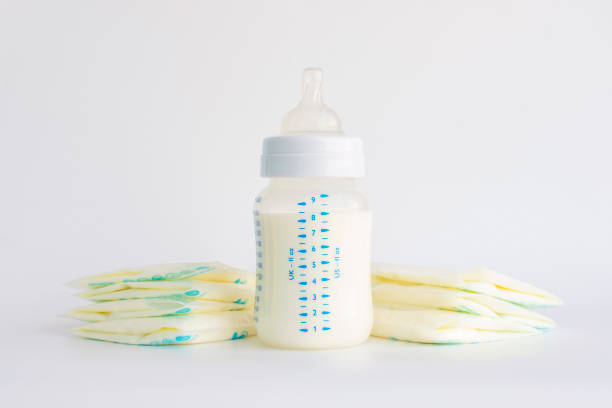Why is my milk supply dropped? Breastfeeding can be a challenging experience for new mothers, especially when they notice a sudden drop in their milk supply. It can be frustrating and concerning to see their baby fussing and not getting enough milk. While there are many reasons why milk supply may decrease, understanding the common causes and how to address them can help mothers continue to breastfeed successfully.
One of the most common reasons for a sudden drop in milk supply is stress. When a mother is dealing with something difficult or struggling in her day-to-day life, it could cause her body to produce less milk. Sleep deprivation can also affect milk supply. According to BabyCenter, stress and sleep deprivation can cause a very sudden drop in milk supply. It is essential for breastfeeding mothers to take care of their mental and physical health to ensure they produce enough milk for their baby.
Dehydration is another factor that might affect milk production. In newborns, this condition is manifested by dark urine, jaundice, and/or lethargy. If the infant is exhibiting one or more of these signs, it might not necessarily be because the supply of breast milk has reduced. According to Medela, other reasons for decreased milk supply include long-term inadequate weight gain for the baby and certain medications. It is important for mothers to talk to their doctor if they suspect any underlying medical conditions that may affect their milk supply.
- Understanding Milk Supply
- Common Causes of Milk Supply Drop
- Impact on Baby and Breastfeeding
- Practices to Boost Milk Supply
- When to Seek Professional Help
- Conclusion
- Frequently Asked Questions
- What are some signs of decreasing milk supply?
- How can I increase my milk supply if it drops?
- Is it common to experience sudden drops in milk supply?
- What are some potential reasons for sudden drops in milk supply?
- Can milk supply be restored after a sudden decrease?
- How can I fix a sudden drop in milk supply?
Understanding Milk Supply

Breast milk is produced on a supply and demand basis. The more a baby feeds, the more milk the breasts will produce. Breast milk production starts during pregnancy with the formation of colostrum, which is a thick, yellowish fluid that is rich in nutrients and antibodies. After delivery, colostrum is replaced by mature milk, which is thinner and whiter in color.
Milk supply is regulated by hormones, primarily prolactin and oxytocin. Prolactin stimulates milk production, while oxytocin causes the milk to be released from the breasts during breastfeeding. The amount of milk produced is influenced by various factors such as the baby’s feeding patterns, the mother’s health, and the frequency and effectiveness of breastfeeding.
Low milk supply can be caused by a variety of factors, including inadequate breastfeeding, infrequent feedings, stress, fatigue, and certain medications. It is important for mothers to understand that a temporary decrease in milk supply is common and does not necessarily mean that they are unable to breastfeed.
To maintain a healthy milk supply, mothers should breastfeed frequently and on demand, especially during the first few weeks after delivery. This will help establish a good milk supply and ensure that the baby is getting enough milk. It is also important to ensure that the baby is latching on correctly and feeding effectively.
In some cases, mothers may need to supplement with formula or express milk to ensure that the baby is getting enough nutrition. However, it is generally recommended that mothers exclusively breastfeed for the first six months of the baby’s life, as breast milk provides the best nutrition and protection against infections and diseases.
Overall, understanding milk supply and the factors that can affect it is essential for successful breastfeeding. By following a few simple guidelines and seeking support when needed, mothers can ensure that they are able to provide their babies with the best possible nutrition and health benefits.
Common Causes of Milk Supply Drop

There are several common causes of milk supply drop. These can be grouped into three main categories: hormonal influences, health and lifestyle factors, and breastfeeding and pumping practices.
Hormonal Influences
Hormonal changes can significantly affect milk supply. For instance, hormonal birth control containing estrogen can decrease milk production. Additionally, hormonal changes during the menstrual cycle can cause a temporary decrease in milk supply. This is because estrogen levels rise and progesterone levels drop, which can interfere with milk production.
Postpartum fatigue, anxiety, and postpartum depression can also affect milk supply. These conditions can disrupt the hormonal balance in the body, leading to a decrease in milk production.
Health and Lifestyle Factors
Several health and lifestyle factors can cause a sudden drop in milk supply. These include dehydration, poor diet, lack of sleep, and tension. Drinking caffeine and smoking can also have a negative impact on milk production.
Certain medications and health issues can also affect milk supply. For example, pain medications containing codeine can decrease milk production. Hypothyroidism, a condition in which the thyroid gland does not produce enough hormones, can also affect milk supply.
Breastfeeding and Pumping Practices
Breastfeeding and pumping practices can also affect milk supply. For instance, not breastfeeding on demand or not pumping enough can lead to a decrease in milk production. Additionally, returning to work and not pumping frequently enough can also cause a decrease in milk supply.
In conclusion, several factors can cause a decrease in milk supply. It is important to identify the underlying cause and take appropriate measures to address it. Ensuring adequate hydration, nutrition, and rest, as well as practicing good breastfeeding and pumping techniques, can help maintain a healthy milk supply.
Impact on Baby and Breastfeeding

A sudden drop in breast milk supply can have a significant impact on both the baby and the mother’s breastfeeding journey. Here are some of the most common impacts:
Impact on the Baby
- Weight gain: When a baby is not getting enough milk, they may not gain weight as expected. This can be a sign that they are not getting enough nutrients to support their growth and development.
- Fussiness: A hungry baby may become fussy and irritable, making it difficult for them to sleep or settle down.
- Dehydration: If a baby is not getting enough milk, they may become dehydrated, which can lead to dark-colored urine, jaundice, and lethargy.
- Nursing on demand: A baby may start nursing more frequently to try and stimulate milk production. This can lead to cluster feeding, where the baby feeds more often than usual in a short period of time.
- Comfort nursing: A baby may start nursing for comfort, even if they are not hungry, which can lead to engorged breasts and discomfort for the mother.
Impact on Breastfeeding
- Stress: A sudden drop in milk supply can be stressful for the mother, which can further impact milk production. Stress can also cause a letdown reflex to slow down, making it difficult for the baby to get enough milk.
- Sleep: A lack of sleep can also impact milk production, as the body needs adequate rest to produce milk.
- Engorged breasts: When milk production slows down, the breasts may become engorged, making it uncomfortable for the mother to breastfeed.
- Letdown: A sudden drop in milk supply can impact the letdown reflex, making it difficult for the baby to get enough milk during a feeding.
It’s important to note that a sudden drop in milk supply is not always due to a decrease in breast milk production. Other factors, such as dehydration, stress, and inadequate rest or nutrition, can also impact milk production. It’s important for mothers to talk to their healthcare provider if they are concerned about their milk supply or their baby’s weight gain.
Practices to Boost Milk Supply

Breastfeeding is an essential part of a baby’s life, and it’s crucial to ensure that the mother has an adequate milk supply. However, sometimes milk supply can decrease, leaving mothers wondering what they can do to increase it. Here are some practices that can help boost milk supply:
Diet and Hydration
A healthy diet and proper hydration are essential for maintaining a good milk supply. Mothers should consume a well-balanced diet with plenty of fruits, vegetables, and whole grains. It’s also important to stay hydrated by drinking plenty of water and avoiding caffeine and alcohol. Some mothers find that certain foods, such as parsley or lactation cookies, can help increase milk supply, but there is limited scientific evidence to support these claims.
Breastfeeding and Pumping Techniques
Breastfeeding and pumping techniques can also help increase milk supply. Power pumping, which involves pumping for short periods of time with short breaks in between, can help stimulate milk production. Mothers can also try massaging their breasts before and during pumping or breastfeeding to help stimulate the letdown reflex. It’s important to ensure that the breast pump is working correctly and to pump frequently, especially during the first few weeks after birth.
Lifestyle Adjustments
Mothers can make lifestyle adjustments to help increase milk supply. Getting enough rest and sticking to a consistent feeding schedule can help stimulate milk production. It’s also important to avoid weaning too early and to feed the baby at night, as this can help stimulate milk production. Some mothers find that using a pacifier can interfere with milk supply, so it’s important to use it sparingly.
In addition to these practices, some mothers may benefit from supplements or medication to help increase milk supply. However, it’s important to consult with a healthcare provider before taking any supplements or medication.
Overall, there are several practices that mothers can use to help boost milk supply. By incorporating these practices into their daily routine, mothers can ensure that they have an adequate milk supply to meet their baby’s needs.
When to Seek Professional Help
If a new mom is experiencing a sudden drop in milk supply, it can be a cause of concern. While there are many reasons why this could happen, it is important to know when to seek professional help.
One of the first things a new mom can do is consult with a lactation consultant. Lactation consultants are trained professionals who can help identify the cause of the milk supply drop and provide guidance on how to increase milk production. They can also help with issues such as latching, clogged ducts, and other breastfeeding challenges.
If a new mom does not have access to a lactation consultant, she can also seek help from her support system. This can include family members, friends, or a breastfeeding support group. Sometimes, just talking to someone who has gone through a similar experience can be helpful.
If a new mom has tried all the common remedies for increasing milk supply, such as nursing more frequently, pumping, and staying hydrated, and her milk supply is still not increasing, it may be time to seek professional help. This could include a visit to the doctor to rule out any underlying medical conditions that could be affecting milk production.
It is important to seek help sooner rather than later, as a prolonged drop in milk supply can lead to other issues such as a decrease in baby’s weight gain. It is also important to remember that seeking professional help does not mean a new mom has failed at breastfeeding. Breastfeeding can be challenging, and sometimes additional support is needed to overcome those challenges.
Conclusion
In conclusion, there are many factors that can contribute to a decrease in breast milk supply. It is important to identify the cause of the drop in milk supply and take appropriate measures to address it. Some common causes of a decrease in milk supply include stress, dehydration, inadequate breastfeeding or pumping, and certain medications.
Mothers who are experiencing a decrease in milk supply should focus on increasing their milk production by breastfeeding or pumping more often, staying hydrated, and maintaining a healthy diet. Additionally, mothers should try to reduce their stress levels and get enough rest to support milk production.
If the drop in milk supply is due to a medical condition or medication, mothers should consult with their healthcare provider to determine the best course of action. In some cases, medication adjustments or treatment for an underlying condition may be necessary to restore milk production.
Overall, with the right support and resources, most mothers can overcome a decrease in milk supply and continue to provide their babies with the nourishment they need to thrive.
Frequently Asked Questions
What are some signs of decreasing milk supply?
Some signs of decreasing milk supply include the baby not gaining weight, not having enough wet diapers, and not seeming satisfied after feedings. The mother may also notice that her breasts feel less full, or that she is not leaking milk as much as usual.
How can I increase my milk supply if it drops?
There are several ways to increase milk supply, including nursing or pumping more frequently, ensuring proper latch and positioning, staying hydrated and well-nourished, and reducing stress.
Is it common to experience sudden drops in milk supply?
It is not uncommon to experience sudden drops in milk supply, especially during periods of stress, illness, or hormonal changes. However, it is important to identify the cause and take steps to restore milk supply if possible.
What are some potential reasons for sudden drops in milk supply?
Some potential reasons for sudden drops in milk supply include illness, hormonal changes, stress, dehydration, certain medications, and infrequent feedings or pumping.
Can milk supply be restored after a sudden decrease?
In many cases, milk supply can be restored after a sudden decrease. This may involve increasing feedings or pumping, improving latch and positioning, reducing stress, and ensuring proper hydration and nutrition.
How can I fix a sudden drop in milk supply?
To fix a sudden drop in milk supply, it is important to identify the cause and take steps to address it. This may involve increasing feedings or pumping, improving latch and positioning, reducing stress, and ensuring proper hydration and nutrition. In some cases, medication or other interventions may be necessary.




